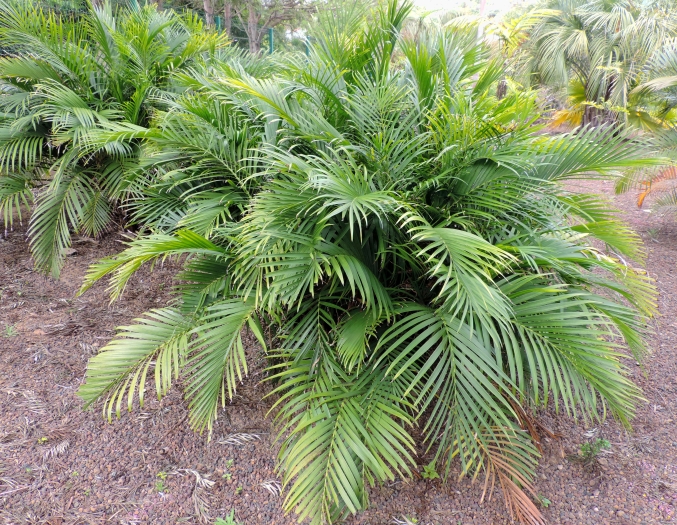Cascade Palm
(Chamaedorea cataractarum)
Cascade Palm (Chamaedorea cataractarum)
/
/

Krzysztof Ziarnek, Kenraiz
CC BY-SA 4.0
Image By:
Krzysztof Ziarnek, Kenraiz
Recorded By:
Copyright:
CC BY-SA 4.0
Copyright Notice:
Photo by: Krzysztof Ziarnek, Kenraiz | License Type: CC BY-SA 4.0 | License URL: https://creativecommons.org/licenses/by/2.0 | Uploader: Kenraiz | Publisher: Wikimedia Commons |







Estimated Native Range
Summary
Chamaedorea cataractarum, commonly known as Cascade Palm, is an evergreen palm native to the understory of tropical rainforests in Southern Mexico. It is a small, trunkless, clumping palm that typically grows to about 2 m (6.6 ft) in height and 2.5 m (8.2 ft) across. The Cascade Palm has glossy, dark green leaves with long, thin leaflets that allow minimal resistance to flowing water, an adaptation to its native riparian habitats where it may experience periodic flooding. This species forms a large, dense clump over time and can be used as a hedge plant in tropical settings.
The Cascade Palm is valued for its lush foliage and suitability for indoor and shaded outdoor environments. It is often grown as an ornamental in gardens and as a houseplant in cooler climates. The palm’s flexible leaflets and creeping growth habit help anchor it against water flow, making it a resilient choice for areas with high moisture. It produces separate male and female flower stalks, with the male stalks withering after pollen release and the female stalks turning bright orange when seeds mature if pollinated. In cultivation, it thrives in part shade to full shade, requiring high amounts of water and well-draining soil. Regular watering is crucial to prevent dry soil, and fertilization every one to two months promotes healthy growth. It is less tolerant of cold temperatures, with a minimum suggested temperature of 4.5 °C (40.1 °F).CC BY-SA 4.0
The Cascade Palm is valued for its lush foliage and suitability for indoor and shaded outdoor environments. It is often grown as an ornamental in gardens and as a houseplant in cooler climates. The palm’s flexible leaflets and creeping growth habit help anchor it against water flow, making it a resilient choice for areas with high moisture. It produces separate male and female flower stalks, with the male stalks withering after pollen release and the female stalks turning bright orange when seeds mature if pollinated. In cultivation, it thrives in part shade to full shade, requiring high amounts of water and well-draining soil. Regular watering is crucial to prevent dry soil, and fertilization every one to two months promotes healthy growth. It is less tolerant of cold temperatures, with a minimum suggested temperature of 4.5 °C (40.1 °F).CC BY-SA 4.0
Plant Description
- Plant Type: Shrub
- Height: 4-7 feet
- Width: 4-8 feet
- Growth Rate: Moderate, Slow
- Flower Color: N/A
- Flowering Season: Spring, Winter
- Leaf Retention: Evergreen
Growth Requirements
- Sun: Part Shade, Full Shade
- Water: High
- Drainage: Fast, Medium
Common Uses
Low Maintenance, Potted Plant, Street Planting
Natural Habitat
Understory of tropical rainforests in Southern Mexico and Central America
Other Names
Common Names: Cat Palm , Cataract Palm , Palmeira-Capim , Palmeira-Cascata , Palmeira-Verde
Scientific Names: Chamaedorea cataractarum , Chamaedorea lindeniana , Chamaedorea martiana , Chamaedorea atrovirens , Chamaedorea flexuosa , Encheila transversa , Nunnezharia cataractarum , Nunnezharia flexuosa , Nunnezharia martiana , Nunnezharoa cataractarum
GBIF Accepted Name: Chamaedorea cataractarum Mart.